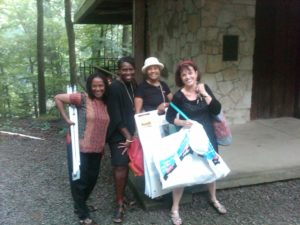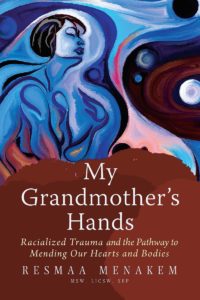
“There is a big difference between learning about trauma and learning a practice. There is a big difference between learning a practice and actually making that practice become a practice.”
-Autumn Brown
It has been my good fortune these past ten years to have three woman friends, playmates really, who are African American. We came together through InterPlay, an art-based system that attempts to “unlock the wisdom of the body.” With others in our community, we have shared our stories, supported one another through tough personal and familial challenges, and danced and sung on behalf of tough societal issues. In connection with other artists, and using forms of our improvisational folk art, InterPlay, we’ve explored and performed on such topics as Eliminating Partner Violence, Removing the Stigma of Mental Illness, Enough Violence: Artists Speak Out, Changing the Race Dance, and the Art of Grieving.
These experiences have taught us that our bodies contain truths that the larger culture is not currently acknowledging. While people of every shade of skin color are busy saying, to themselves and others, “I’m not a racist,” we have come to understand racism as a wound or injury that we all suffer. Recognizing that the “isms,”- racism, sexism, ageism, are held in our bodies and that by healing the effects of this generational trauma in ourselves, we can heal them in the larger group body as well.
A few months ago, following the suggestion of one of our African American sisters, eight white members of our troupe set out to use the forms of InterPlay to explore racism through a book by social worker Resmaa Menakem, “Grandmother’s Hands – Racialized Trauma and the Pathways to Mending Our Hearts and Bodies. Menakem, a somatic therapist, has worked with both black and white people, and police officers, to heal the effects of the generational trauma of 200 plus years of white body-supremacy in our western culture, and he suggests that some of the work needs to be done separately by each group.
We all carry in our bodies the effects of hundreds of years of cultural generational trauma that has disrupted our autonomic nervous systems. This has resulted in our internalizing “lighter is better” standards of beauty, an unconscious bias that expects black and brown-skinned people to do less well in school, or in the workplace, many incidents of white people quickly calling the police if they see a brown or black skin person in their neighborhood, or police over-reacting to a black crime suspect, or a brown-skinned child with a toy gun.
The process of healing is to learn to acknowledge the effects of white body supremacy and be able to self-soothe – to settle our own bodies in the midst of conflict and uncertainty. This gives us the opportunity to move through what he calls “clean pain,” and avoid pushing our pain off onto others, creating more “dirty pain” and trauma. The personal result of this work is to become a true grown up. And if our culture is to heal, it’s clear it will take many more grown-ups than are currently in evidence.
Our group found the body and breath practices to self-soothe suggested in the book similar to what we do in our InterPlay warm-up. Doing the practices together gets us into the present moment and “in our bodies.” It also allows us to become a “group body” – to form a container where bodies feel safe and relaxed, and where we each have access to our creative resources.
Menakem’s book provided us with immensely important historical information and inspiring confirmation that we somatic-oriented folks are on the right track – teaching and using body-wise tools to be in touch with our wounds, to self-soothe and create a satisfying sense of belonging as we share stories and explore the challenging issues of our time. Dreaming big, perhaps such communal experiences can morph into a trauma-informed culture that serves us all.
What have you found helpful in changing your reaction to the race dance that our country has been doing since way before we were born?
Book – Grandmother’s Hands https://www.resmaa.com/books/


